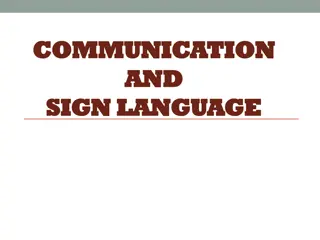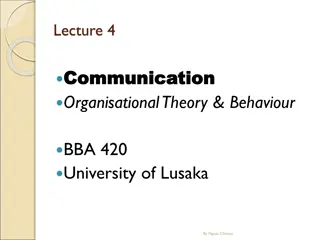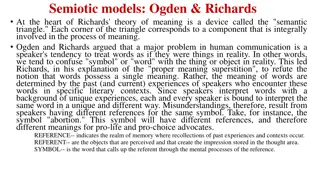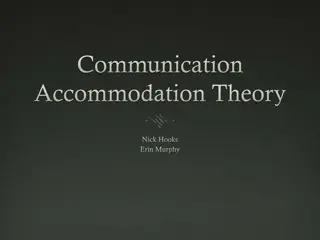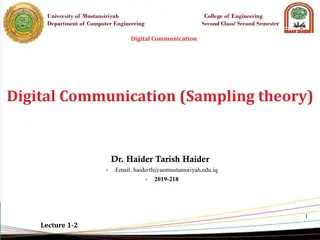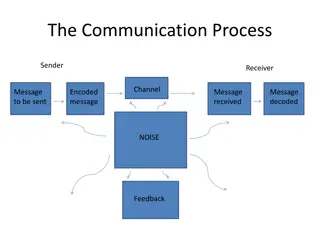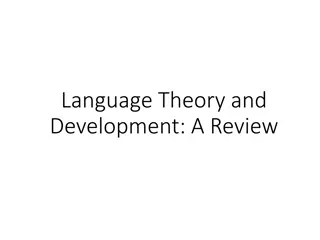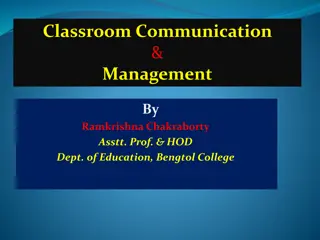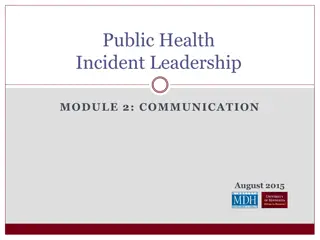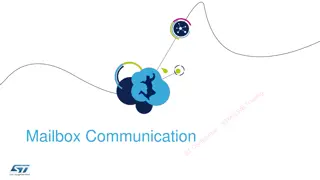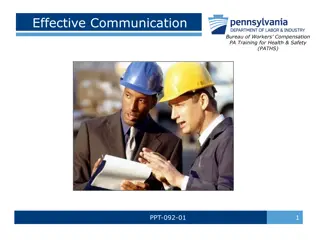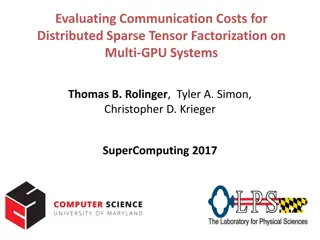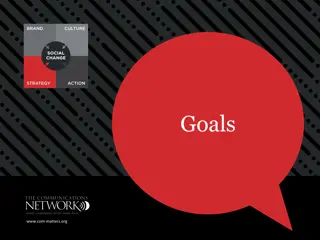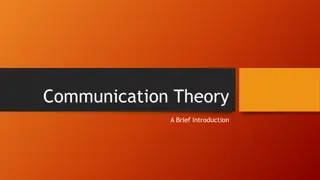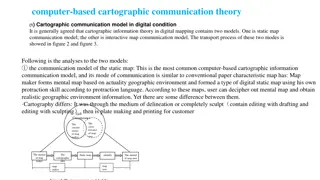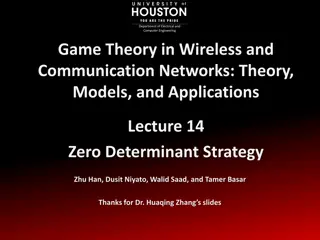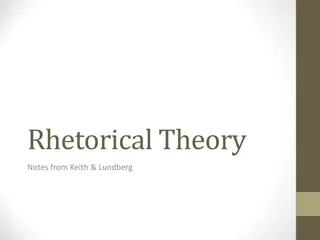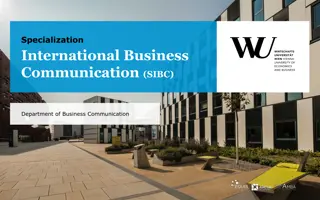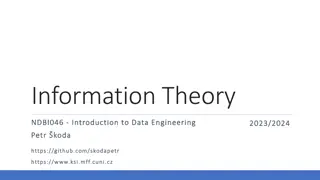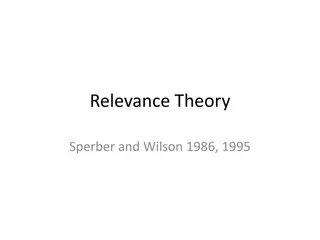Mastering Business Writing Skills: A Comprehensive Guide
Understanding the essence of business communication, types of communication, essentials of effective communication, smart communication tips, and communication across cultures is vital for professional success. Explore verbal, written, and non-verbal communication methods to enhance your communicati
0 views • 47 slides
Evolution of Mathematical Theories and Proof Systems
Development of mathematical theories such as model theory, proof theory, set theory, recursion theory, and computational complexity is discussed, starting from historical perspectives with Dedekind and Peano to Godel's theorems, recursion theory's golden age in the 1930s, and advancements in proof t
1 views • 29 slides
Understanding Communication and Sign Language
Communication is the vital process of exchanging information, ideas, and emotions through various channels such as speech, signals, and writing. This includes verbal and non-verbal communication, where sign language plays a crucial role. Effective communication depends on the sender, message, channe
1 views • 31 slides
Psychological Theories of Criminality: Understanding the Roots
Psychological theories of criminality delve into the association between intelligence, personality, learning, and criminal behavior. Major theories include Psychodynamic Theory by Freud, Behavioral Theory by Bandura, and Cognitive Theory by Kohlberg. These theories explore how unconscious mental pro
1 views • 20 slides
Understanding Communication in Organisational Behaviour
Explore the concept of communication in organisational theory and behaviour, covering definitions, types, functions, theories, barriers, and effective communication skills. Delve into the disciplines contributing to organisational behaviour and the role of communication in decision-making. Gain insi
1 views • 39 slides
Enhancing Zoonotic Disease Risk Communication in Public Health Emergencies
Explore the significance of adopting a One Health approach to zoonotic disease risk assessment and communication in the context of emergency health situations. The session emphasizes core capacities required by the International Health Regulations (IHR) 2005, effective risk communication processes,
2 views • 13 slides
Effective Communication Skills for Healthcare Professionals
Enhance your communication skills with the Accelerated Preceptorship Communication Session by Desiree Cox. Learn the importance of effective communication, different communication preferences, communication dynamics, non-verbal communication, listening skills, and more. Understand the communication
2 views • 28 slides
Understanding the Theory of Firms: Neoclassical vs. Modern Approaches
The theory of firms is explored through the Neoclassical and Modern perspectives. Neoclassical theory focuses on profit maximization, while Modern theory delves into managerial, principal-agent, and transaction cost theories. The discussion covers criticisms of Neoclassical theory and the essential
1 views • 79 slides
Theories of Causation in Psychological and Social Sciences
Overview of theories of causation categorized into psychological, social psychological, and sociological perspectives. Psychological theories focus on instinctive, biological, and psychological qualities of abusers, including Attachment Theory, Psychodynamic Theory, Social Learning Theory, and Situa
0 views • 15 slides
Understanding Political Theory through a Contextual Approach
Exploring G.H. Sabine's perspective on political theory through a contextual approach, emphasizing the importance of historical context and societal influences. Sabine argues that while political theory evolves with its contemporary politics, it should be analyzed within its specific time and social
0 views • 9 slides
Semiotic Models: Theory of Meaning by Ogden & Richards
Ogden & Richards proposed the theory of meaning through the "semantic triangle," emphasizing the role of past experiences in interpreting words. They highlighted the importance of distinguishing symbols from the actual referents to avoid misunderstandings. Additionally, Richards discussed the effect
0 views • 14 slides
Understanding Communication Accommodation Theory
Communication Accommodation Theory explores how individuals adjust their communication behaviors in interactions. Assumptions include considering past experiences, perception, and evaluation, social status communication, and appropriateness of accommodation. Convergence, a strategy where individuals
1 views • 12 slides
Understanding Digital Communication and Sampling Theory in Computer Engineering
Digital communication in the context of computer engineering involves representing information in binary form for transmission. Sampling theory plays a key role in pulse modulation techniques, noise management, and modulation schemes like ASK, PSK, FSK, and QPSK. This course covers various topics su
7 views • 14 slides
Evolution of Light Theory: From Wave Theory to Quantum Theory
At the turn of the century, the discovery of the photoelectric effect challenged the wave theory of light, leading to the development of the quantum theory by Max Planck and Albert Einstein. This new theory introduced the concept of discrete energy units known as quanta, bridging the gap between wav
1 views • 62 slides
Dp-branes, NS5-branes, U-duality, and M-Theory Overview
Overview of Dp-branes, NS5-branes, and U-duality derived from nonabelian (2,0) theory with Lie 3-algebra. Introduction to M-theory, including M2-branes and M5-branes in the strong coupling limit. Discussion on BLG theory, Lorentzian Lie 3-algebra, and the ABJM theory for M2-branes.
1 views • 32 slides
Effective Communication Strategies in Business Environments
Explore the various aspects of communication processes within organizations, including sender-receiver dynamics, communication channels, small group networks, upward and downward communication methods, business communication tools, information richness of channels, email and voice mail etiquette, an
0 views • 21 slides
New Developments in Language Theory and Development
Explore the latest resources and research in the field of language theory and development. Discover essential texts by authors such as Fogle and Roseberry-McKibbin, covering topics like communication disorders and multicultural language needs. Gain insights into cognitive theory, social interactioni
1 views • 87 slides
Understanding Time-Independent Perturbation Theory in Quantum Mechanics
Perturbation theory is a powerful tool in solving complex physical and mathematical problems approximately by adjusting solutions from a related problem with known solutions. This theory allows for more accurate approximate solutions by treating the difference as a small perturbation. An example inv
0 views • 19 slides
Ethical Theories: Divine Command vs. Virtue Theory Explained
Divine Command Theory asserts that morality is derived from God's commands, contrasting with Virtue Theory which focuses on developing moral virtues to achieve human flourishing and excellence. Divine Command Theory relies on religious texts, while Virtue Theory emphasizes the cultivation of virtues
0 views • 24 slides
Understanding Classroom Communication and Management by Ramkrishna Chakraborty
Communication is a vital process of exchanging information, ideas, and opinions between individuals. In the educational context, effective communication is essential for achieving desired behavior patterns. This article explores the meaning, concept, and types of communication, emphasizing the impor
1 views • 19 slides
Understanding Fermi Liquid Theory in Interacting Fermion Systems
Fermi liquid theory, also known as Landau-Fermi liquid theory, is a theoretical model that describes the normal state of metals at low temperatures. Introduced by Landau and further developed by Abrikosov and Khalatnikov, this theory explains the similarities and differences between interacting ferm
0 views • 23 slides
Effective Communication Strategies in Public Health Incident Leadership
Learn about the importance of effective communication within emergency operations centers during public health incidents. Explore communication tools, techniques, and case examples of communication failures. Discover key aspects such as team communication, situational awareness, shared mental models
0 views • 16 slides
Communication Protocols for System Integration
This technical document explores various communication protocols used for system integration, focusing on mailbox communication, interprocessor communication, system communication using IPCC, and BLE communication utilizing different IPCC channels. The document delves into the features, functions, a
1 views • 6 slides
Effective Communication Skills in Business Environment
Understand the importance of communication in organizations, learn about the process of communication, main objectives, types, and patterns of communication. Explore key points such as accuracy in conveying ideas, feedback, and communication channels. Enhance your knowledge on downward, upward, and
0 views • 24 slides
Mastering Effective Communication Skills in Daily Life
Enhance your communication skills with insights from Unit 5 Communication. Learn about different types of communication, speaking skills, effective communication strategies, assertiveness, and more. Understand the nuances of verbal, nonverbal, and paralanguage communication to convey your message cl
0 views • 52 slides
Computational Learning Theory: An Overview
Computational Learning Theory explores inductive learning algorithms that generate hypotheses from training sets, emphasizing the uncertainty of generalization. The theory introduces probabilities to measure correctness and certainty, addressing challenges in learning hidden concepts. Through exampl
0 views • 43 slides
Automata Theory and Theory of Computation Overview
This course overview covers concepts in automata theory and theory of computation, including formal language classes, grammars, recognizers, theorems in automata theory, decidability, and intractability of computational problems. The Chomsky hierarchy, interplay between computing components, modern-
0 views • 42 slides
Effective Communication in Workplace Safety Training
This presentation covers the importance of effective communication in workplace safety training, emphasizing the elements of a communication plan, communication processes, and the realities of communication. It explores the consequences of failure to communicate safety information effectively and di
1 views • 31 slides
Communication Costs in Distributed Sparse Tensor Factorization on Multi-GPU Systems
This research paper presented an evaluation of communication costs for distributed sparse tensor factorization on multi-GPU systems. It discussed the background of tensors, tensor factorization methods like CP-ALS, and communication requirements in RefacTo. The motivation highlighted the dominance o
0 views • 34 slides
Theories of Interest in Microeconomics II
Explore various theories of interest in economics, including the Classical Theory, Liquidity Preference Theory by Keynes, Productivity Theory, Abstinence Theory, Time-Preference Theory, Fisher's Time Preference Theory, and the Loanable Fund Theory. These theories offer different perspectives on the
0 views • 6 slides
Strategic Communication Goals and Objectives
Clearly defining goals and objectives is essential in strategic communication. This involves setting realistic and aligned targets, such as building communication capacity, influencing policy, and engaging public will. Communication plays a crucial role in achieving social change and programmatic su
0 views • 67 slides
Exploring the Evolution of Atomic Theory
Delve into the historical journey of atomic theory starting from Democritus and Aristotle's views to modern advancements proving some aspects of Dalton's theory incorrect. Learn about key laws and theories such as the Particle Theory of Matter, Dalton's Atomic Theory, and JJ Thomson's discoveries, s
0 views • 30 slides
Exploring Communication Theories: A Comprehensive Overview
Delve into the fascinating world of communication theories, ranging from the genesis of Information Theory in the 1920s to contemporary frameworks like Expectancy Violations Theory and Social Information Processing Theory. Understand how theories provide explanations, predictions, and avenues for re
0 views • 18 slides
The Evolution of Cartographic Communication Theory in the Digital Age
Cartographic communication theory in digital mapping involves two models: the static map communication model and the interactive map communication model. The static map model follows traditional map-making methods adapted to digital tools, while the interactive map model leverages user feedback to r
0 views • 8 slides
Game Theory Applications in Wireless Communication Networks
Explore the application of game theory in wireless communication networks through lectures covering various game theory concepts such as non-cooperative games, Bayesian games, and cooperative games. The focus is on Zero-Determinant Strategy, a method used for resource sharing and power control in wi
0 views • 36 slides
Understanding Rhetorical Theory: Key Concepts and Applications
Rhetorical theory explores the study of persuasive language and communication, tracing its origins from Plato to modern applications in shaping identity, power dynamics, and democracy. The theory delves into the importance of audience analysis, ethical considerations, and the interplay between messa
0 views • 14 slides
Specialization in International Business Communication (SIBC)
Specialization in International Business Communication (SIBC) offered by the Department of Business Communication focuses on the critical role of communication in various business settings, emphasizing skills in language usage, communicative competence, and strategic language application. The progra
0 views • 11 slides
Macromechanical Analysis of Lamina and Tsai-Hill Failure Theory Overview
The Tsai-Hill failure theory is based on the strengths of a unidirectional lamina, incorporating longitudinal and transverse tensile and compressive strengths, as well as in-plane shear strength. This theory, derived from the distortion energy theory, provides criteria for determining lamina failure
0 views • 15 slides
Introduction to Data Engineering and Information Theory
This content delves into the fundamentals of data engineering and information theory, focusing on topics such as data communication, sharing, storage, and archiving. It explores key concepts like data representation, corruption prevention, historical milestones in communication technology, Shannon's
0 views • 24 slides
Understanding Relevance Theory: Sperber and Wilson's Approach
Relevance Theory, introduced by Sperber and Wilson in 1986, aims to explain how propositions are understood without relying on mutual knowledge. It addresses deixis, ellipsis, vagueness, and ambiguity while exploring implicatures and providing a general theory of communication beyond just verbal int
0 views • 38 slides


